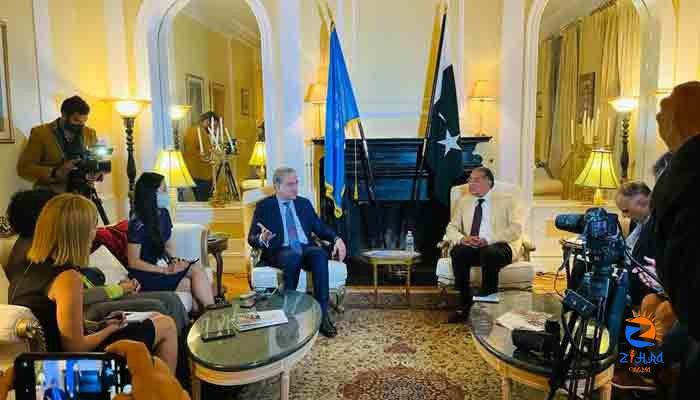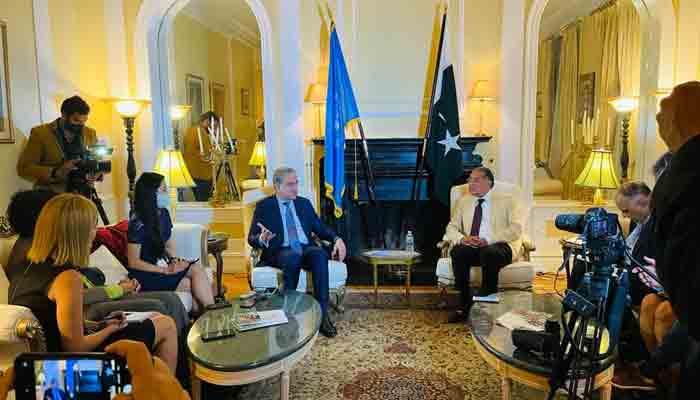
[ad_1]
NEW YORK: Foreign Minister Shah Mehmood Qureshi Tuesday said nobody was in a rush to recognize the Taliban government and asked them to be more sensitive and receptive to the international viewpoint.
During a meeting with the UN press representatives in New York, FM Qureshi urged the world to support Afghans at a critical juncture through different steps, including unfreezing their assets.
“Afghans have faced war in the last four decades so the international community should not leave Afghans alone now,” said the foreign minister.
He said, “a peaceful Afghanistan will benefit the whole region. Pakistan wants peace and stability in Afghanistan because if the Afghanistan situation deteriorates, Pakistan will be [the] most affected.”
Qureshi said Pakistan has been hosting more than three million Afghan refugees for the last four decades with limited resources and without financial support from the international community.
Pakistan’s economy can no longer bear the burden of refugees, he added.
Qureshi said his country gave all-out support for the evacuation of citizens, diplomatic staff and media representatives of different countries from Afghanistan.
The federal minister said Pakistan, like other neighbours, seeks a comprehensive coalition government in Afghanistan. He said Pakistan believes that the reconciliation process in Afghanistan cannot be completed without the formation of a government that has a representation of all political parties.
The initial statements made by Taliban leaders are encouraging, said Shah Mehmood Qureshi, adding that respecting international opinion and keeping its promises is in the best interest of the Taliban as they seek recognition by the world.
“I don’t think anybody is in a rush to recognise them at this stage and the Taliban should keep an eye on that as they have to be more sensitive and more receptive to international opinion.”
“In my opinion, unfreezing the frozen assets of Afghanistan for [the] Afghans may serve as a major step for confidence-building that could also incentivise positive behaviour,” he said.
“On one hand, you’re raising fresh funds to avert a crisis and on the other hand money that is theirs — belongs to them — they cannot use. I think freezing the assets is not helping the situation. I would strongly urge the powers that be that they should revisit that policy and think of an unfreeze.”
The United States froze $9.5 billion in Afghan central bank assets and international lenders have stayed clear of Afghanistan, wary of providing money that could be used by the Taliban.
Qureshi said several positive aspects also emerged during the current transition in Afghanistan. The absence of bloodshed and civil war during this recent change is a positive aspect, he said, adding that the statements made by the Taliban regarding the end of the war, amnesty, respect for basic human rights and protection of women’s rights are encouraging.
Pak-India ties
The federal minister also highlighted the Imran Khan-led government’s good intentions towards India. He said Prime Minister Imran Khan, after taking office, invited India to take one step towards peace which Pakistan will reciprocate with its two steps.
However instead of accepting the offer, India took unilateral and unconstitutional steps in Occupied Jammu and Kashmir on August 5, 2019, which further complicated the situation, the federal minister said.
“We want peace. Even today, India has an option. If it wants peace in the region, it should stop the ongoing atrocities on Kashmiris and reverse all unconstitutional measures of August 5,” he said.
He said voices are being heard today from within India against its Hindutva policies.
Pakistan seeks partnership in peace efforts in the region, he said.
Among those who met the foreign minister were representatives of The Associated Press Edith Lederer, AFP’s Shaun Tandon, Al-Arabiya Al-Jadeed’s Ibtisam Azem, Newsweek’s Tom O’Conner, Bloomberg’s David Wainer, Tass – Russian news agency’s Vladimir Kostyrev, Nikki’s Wajahat Khan and Kaori Yoshida, Anadolu News Agency’s Betul Yuruk, and the Associated Press of Pakistan’s Iftikhar Ali.
[ad_2]
